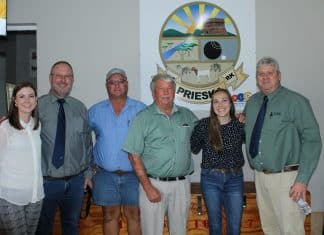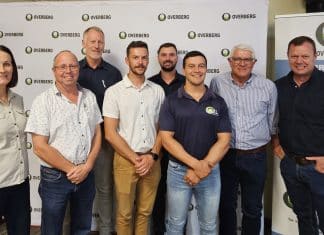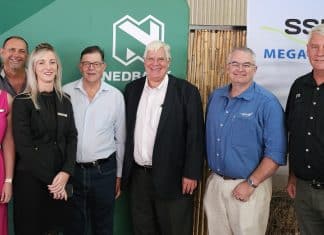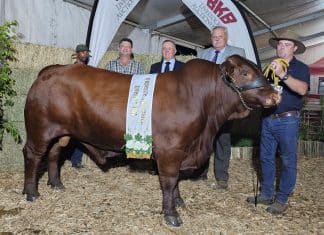Estimated reading time: 7 minutes
When Shakes Shabalala of Ladysmith resigned from the South African National Defence Force (SANDF) in 2017, the plan was to set up a farming business that would create space for his family to become involved and build generational wealth. They opted for a primary co-operative as a vehicle to achieve this. Being of Swazi descent, they called the co-operative Ubuhle bamaSwazi, which means ‘the beauty of our clan’.
“I have been farming on a part-time basis for a long time, running mainly goats, but also some sheep and approximately 15 cattle on communal lands in the Roosboom area of Ladysmith. I have a passion for farming, and I always planned on doing it full time after leaving the SANDF.”
Different ventures for success
Growing from such a small number of livestock into a full-time farmer, however, represents a big jump with many obstacles along the way. The first, he says, was finding adequate grazing land to lease. At the moment Shakes is leasing 300ha in the Wasbank area of Ladysmith.
“I planned from the start to focus on goat production, seeing as there is such a well-established market right here on our doorstep. I even had ambitions to establish an export market for my goats, but with the demand of the local market, that is still a long way off. Meanwhile I have also started to expand my cattle and sheep herds.
“If you are in a growth phase, the reality is that you will run into all sorts of cashflow problems. So, I realised I needed another venture that could fill the cashflow gaps. I opted to rear pigs because the turnaround time is about five months and the profit margins are very satisfactory.
An unexpected, though very small, income stream came from his indigenous Zulu chickens. “I have always had some chickens around the yard for biological pest control. To my surprise, when I took a few chickens to the local auction, there was fair interest in them. Now I regularly sell them at the auction.”
Raising cattle for the feedlot
Shakes favours red cattle. His herd consist mainly of Bonsmara, Beefmaster and Brangus, although there are a number of Drakensberger and Simbra in the mix as well.
“I believe quality wins every time, so I am prepared to spend money on good bulls. For a calf-breeding operation to succeed, easy calving cows and calves with a good weaning weight are key factors to consider.”
He currently has around 100 cows, four bulls, 16 replacement heifers and 40 calves at foot. They manage two breeding seasons per year and the calving percentage is in the deep 90% range.

“The main breeding season is from the end of November to the end of March. We perform pregnancy testing at the end of May. The second breeding season is from July to September. Cows may skip once, and move to the next breeding season. However, if they fail to calve then, they are culled and replaced. I try to replace at least 10% of the herd every year.”
Weaner calves are sent to Sharp Sharp Feedlot in the Wasbank area. The feedlot wants weaners that weigh between 200 and 260kg, and Shakes is able to easily adhere to this guideline. “It is very beneficial to have a feedlot close by with whom one has a personal relationship. The feedlot not only wants my calves, but also my sheep and pigs. They are prepared to pay for quality, so my job is to make sure I can supply what they want.”
The lucrative goat market
Shakes says the demand for goats far exceeds what he can supply. He sells a lot of his goats at auctions and supplies hawkers from Ladysmith and Dundee. He also has a site in Roosboom from where he sells goats out of hand.
The key to successful livestock production, says Shakes, is good genetics and nutrition. There is no point in having a good breeding programme and raising superior offspring, if they are not given the correct feed at the right time.
“Creep feeding especially kids and lambs is a crucial part of raising young animals. After weaning, those kids and lambs need a good grower ration so that they can quickly reach their target weights, either to be sold or to be retained as replacement animals. A replacement ewe that did not grow out well will simply never reach her full potential.”
Shakes points out, however, that his animals are not fed intensively. Young livestock go out to the veld every day and only receive additional feed in the kraal in the evening.
“I know this is expensive and I sacrifice approximately 30% of my profit because of this, but the advantages in terms of the time it takes to get my slaughter animals market ready, and the type of replacement animal I get, more than compensate for this increased cost.”
Ubuhle bamaSwazi
The idea behind forming a co-operative for their farming enterprise, says Shakes, was for every member of the family to be able to focus on a specific aspect.
“My wife, Leah, is the treasurer of the co-op and specialises in poultry – both broilers and layer hens. Our eldest daughter, Zinhle, is a nurse by profession and is our marketing officer. Thandeka, our second daughter, is the secretary of the co-op. She has a real interest in agriculture, especially in empowering farmers to reach their full potential. She is also an intern at the Genex Cooperative Development Programme (CDP).
“Our son, Sphelele, has a crop production diploma from the University of Mpumalanga. He is currently involved in cabbage production, but the plan is that, as soon as we have access to more arable land, he will manage our crop production activities. As our livestock numbers grow, there will be a growing need for good animal feed, which will be his responsibility.”
Shakes is also the chairperson of the Isibonelo Esihle Secondary Cooperative based in Ladysmith. Isibonelo Esihle is one of the three co-ops in KwaZulu-Natal that is part of the Genex CDP, which aims to develop emerging beef cattle producers to become more profitable and sustainable. The programme offers services such as formal training, bulk buying of inputs, group studies and mentorship.
A solid plan for the future
Shakes says he hopes that Ubuhle bamaSwazi will one day be able to own farmland and that they would receive assistance from government in this regard.

“Our aim is to become fully-fledged commercial producers, with a herd of at least 500 cows, and to create job opportunities in the process. To get there, however, requires a major cash injection. That is the main challenge. Running such a large herd also has other implications. We would need to produce feed for winter, which means more implements. We are in no way able to do this without assistance.”
Being in his mid-fifties, Shakes has set up a ten-year plan for the business. “I want to retire at 65, and my children must then take over. My first objective is therefore to be able to declare myself a commercial producer and my second is to create over 50 job opportunities.
“My next aim is to have a resilient and diversified enterprise consisting of several income streams that will allow us to utilise all our resources optimally. These income streams will come from a mix of intensive and extensive operations.” – Izak Hofmeyr, Stockfarm
Read an update on Shakes and his family here.
For more information, phone Shakes Shabalala on 063 731 5003.








